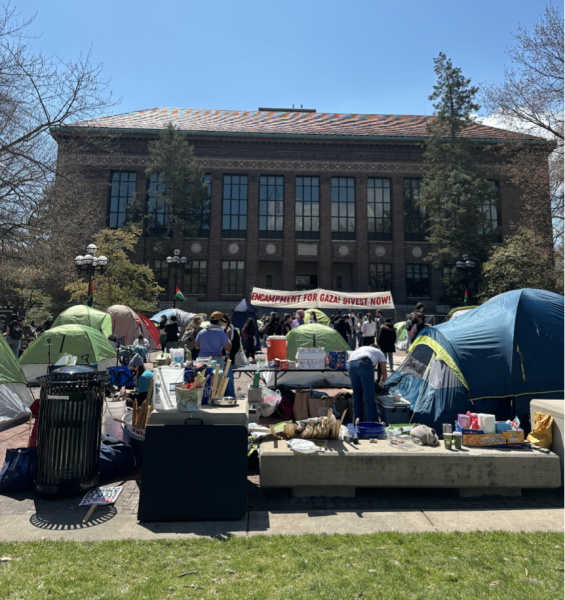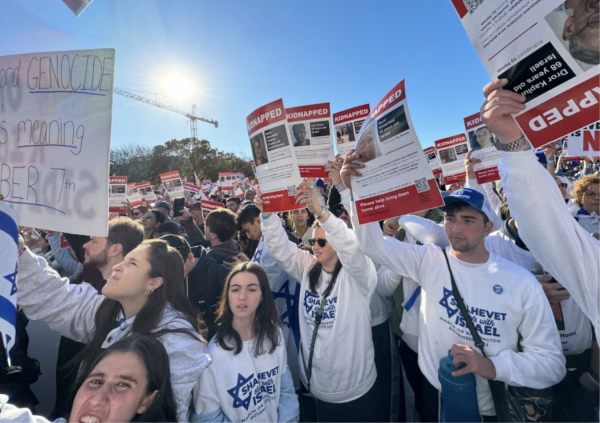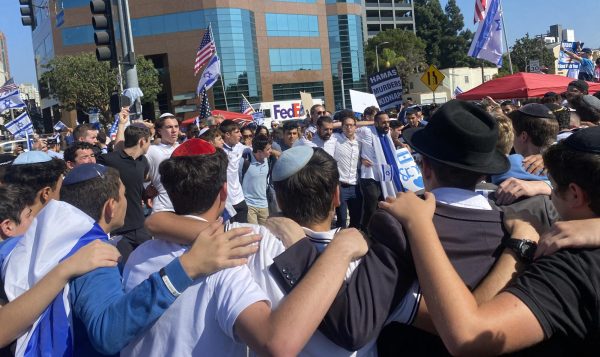Israeli election chooses same old same old — but not exactly
Five weeks later, Netanyahu is still trying to form a government; key policies may or may not change
COALITION: Prime Minister Benjamin Netanyahu met with his security team March 26. Religious and defense-oriented parties have held his government together in the past, and may again.
After a tight race in Israel, it is almost definite that Likud party leader Benjamin Netanyahu will continue as Prime Minister, forming a coalition with right-wing and religious parties to govern the country.
But on May 13, the prime minister had to ask for a two-week extension, leaving key policy decisions still undecided because exactly which parties will join a new coalition remains unclear.
Israelis headed to the polls April 9 to decide whether Netanyahu would secure a fifth term in office or if it was time for a new Prime Minister — possibly former IDF chief Benny Gantz, who turned out to be Netanyahu’s main rival.
When all the votes were counted, Gantz’s new Blue and White party and Netanyahu’s Likud had each secured 35 Knesset seats. The parties with the next-most seats are Shas, a Haredi political party, and United Torah Judaism, both considered right-wing and expected to be part of Netanyahu’s coalition.
According to Israel Education teacher Mr. Jeremy Shine, the issue most important to those groups is religious exemption from military service.
“The religious parties, Shas and United Torah Judaism, tend to go with whoever can offer them the most,” said Mr. Shine. “If the left can offer them exemption from serving in the army, they’ll go with the left. If the right offers them that, they’ll go with the right.”
But it’s considered likely that they’ll join Netanyahu even without guaranteeing a military exemption, observers said. When the election was over, according to news reporrts, leaders of both Shas and UTJ announced they’ join Likud.
“The voters have spoken and this gives a fresh mandate to Bibi, the Likud party, and the parties that will be in his coalition to govern,” said Zev Hurwitz, Director of Campus Affairs for the American Jewish Committee.
“We always talk about Israel being a shining example of democracy in a neighborhood that doesn’t have a lot of it,” said Mr, Hurwitz, a Shalhevet alumnus who graduated in 2011.
According to Israel’s Central Bureau of Statistics, 5.8 million Israelis were eligible to vote this year, 79 percent of whom are Jewish and 16 percent Arab. Ra’am and Balad, both Arab political parties, combined and were able to get four seats in the election.
In Israeli elections, any party that does not receive at least 3.25 percent of the popular vote gets no representation at all in the new Knesset. This electoral threshold ensures that all parties who are there have at least three seats.
The party with the most seats generally offers ministerial positions to leaders of other parties in exchange for their support.
Some thought that for Netanyahu to succeed, he’d have to promise not to implement a law passed several years ago to start requiring military service of religious men. The law, which is fiercely opposed by religious parties, was passed in 2014 and is set to go into effect soon.
Netanyahu’s previous government had a slim majority of 61 Knesset seats, which led to the early elections. He previously had held 66 seats, but former Defense Minister Avigdor Lieberman pulled his party, Yisrael Beiteinu, out of the coalition partly because of the draft law.
“It could be that Lieberman would be willing to make that a secondary issue not to be pursued in this particular term, because Lieberman will say security is more important and we have to support the Likud on the security issue” said Mr. Shine.
Most observers believe now that that is what will happen — meaning that this year’s elections, which were held several months early after Lieberman pulled out, left the government of Israel very similar to what it was before.
But the election itself brought changes in Israeli policy.
Three days prior to the elections, Netanyahu said if he won he would annex the West Bank. Currently, there are major Israeli cities like Efrat that are located there that all agreed would be part of Israel in any two-state solution.
But the area is not formally recognized as part of the country, and there are many smaller setllements there that are illegal under current Israeli law. These settlements would all become officially part of Israel.
About 2.5 million Palestinians live in the West Bank, compared to 400,000 Jews.
Unlike in the U.S., where you vote for a person who is on the ballot, in Israel you vote for a list of party members and depending on how many votes that party gets, starting from the top, a certain number of the people on the list will get to sit in Knesset.
Once the number of Knesset representatives of each party is finalized, Israel’s president decides which individual candidate is most likely to be able to form a stable coalition. The chosen individual then has 28 days to attempt to form a coalition. The president can grant the party a 14-day extension if need be.
On Monday, May 13, President Reuven Rivlin approved of Netanyahu’s request for a two week extension to form a government.
Therefore, it is still not 100 percent certain that Netanyahu will be prime minister again. In 2009, for example, Tzipi Livni of the Kadima party was not able to form a coalition, so Likud was given the chance to try and they succeeded.
Whatever happens, Prime Minister Netanyahu himself will most likely end up where he was before — with a majority that looks stronger, but that still is held hostage to parties he doesn’t entirely agree with, whether Lieberman’s Yisrael Beiteinu — which favors drafting Haredim into the military and favors stronger military responses to Palestinian rocket attacks — or another coalition partner like Blue and White.
“I think Netanyahu’s done a very good job politically as positioning himself as being ‘the’ option” said Mr. Hurwitz.
“Voters keep asking this question: Who is the most suitable to be prime minister? Even supporters of other parties, the smaller parties who know that their top person isn’t going to be prime minister because they just don’t have the votes, are saying the most suitable to be prime minister is Netanyahu.”
Get the latest from The Boiling Point. Sign up for our news feed.











